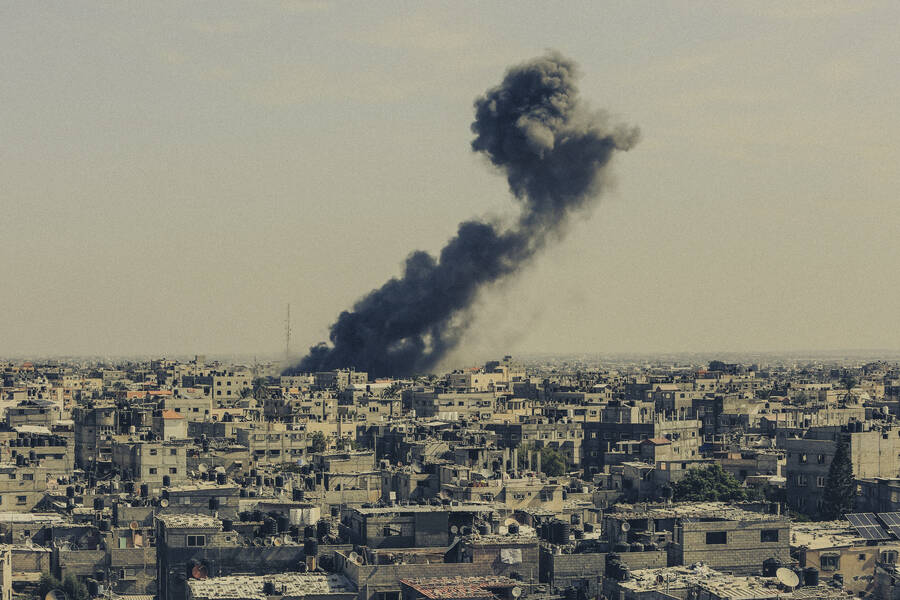
Smoke rises after an Israeli airstrike on Rafah in the southern Gaza Strip, October 21st, 2023.
On May 8th, in an interview on CNN, President Joe Biden announced that the United States would halt shipments of bombs and artillery shells to Israel if the Israeli military entered the heart of Rafah, Gaza’s southernmost city. Biden also confirmed that the US was currently blocking the delivery of one shipment of 2,000- and 500-pound bombs because “civilians have been killed in Gaza as a consequence of those bombs.” This was the president’s first acknowledgement that US-supplied weapons have killed Palestinian civilians in Gaza. Coming from an administration that has repeatedly said there are no conditions on military assistance to Israel, the new posture alarmed some on Capitol Hill. Republican Senator Tom Cotton claimed the president had imposed a “de facto arms embargo” on Israel, and 26 pro-Israel Democrats wrote a letter to Biden lamenting the decision. Meanwhile, Democrats critical of Israel’s conduct, as well as human rights advocates, called Biden’s announcement a good, if insufficient, first step. “President Biden is absolutely right to halt [a] bomb delivery to this extreme, right-wing Israeli government,” said Senator Bernie Sanders. “The US must now use all its leverage.”
The next day, however, National Security Council spokesman John Kirby sought to soften Biden’s announcement. “There is no weapons shipment cut-off here,” Kirby told reporters during a press briefing. “Weapons shipments are still going to Israel.” In fact, on the same day as Biden’s interview, US officials told news outlets that the administration had just approved the transfer of $827 million worth of weapons and equipment to Israel. (It’s unclear what kind of weapons are included in that shipment.) On May 14th, the Biden administration notified Congress that it planned to send Israel an additional $1 billion worth of tank ammunition, mortar rounds, and military vehicles, all of which are used in ground combat. The announcement of new transfers came just weeks after the president signed a bill into law authorizing an additional $17 billion in military assistance to Israel—and amid a broader surge in weapons shipments to Israel since its seven-month bombardment of Gaza began, during which time the administration has approved and delivered over 100 separate arms sales.
Significantly, two days after Biden’s CNN interview, the State Department sent a report to Congress concluding that while Israel had likely violated international law in Gaza in specific incidents, the administration nevertheless found Israeli assurances of using US weapons in line with international law “credible and reliable.” The report further emphasized that “a country’s overall commitment to international law is not necessarily disproven by individual . . . violations, so long as that country is taking appropriate steps to investigate and where appropriate determine accountability” for such breaches, which the report said Israel is doing. These determinations might appear roundabout, but their effect is clear: to allow the US to continue sending weapons to Israel.
In pausing a single weapons shipment while refusing to reevaluate the legality of military aid to Israel as a whole, experts say the Biden administration is trying to send a message to Israel of concern for Palestinian civilians while ensuring that there is no long-term shift away from continued shipments of US weapons to the country. “The administration is treating this like a discretionary issue, and it’s not—it is a legal issue,” Annie Shiel, US advocacy director for the Center for Civilians in Conflict, told Jewish Currents. “There are US laws and international law that say that in the face of very clear evidence of devastating civilian harm, apparent violations of international humanitarian law, and of restrictions to humanitarian aid, US arms transfers cannot continue.” Josh Paul, a former State Department official in the bureau that oversees arms sales, concurred with this assessment, adding that Biden administration officials are avoiding making a clear determination because they want to “steer clear of putting themselves in a position where their policy options are limited by law.”
Ever since Israel began its war on Gaza in October—which a number of international legal experts have deemed a genocide—human rights advocates and some Democrats in the House and Senate have argued that US law requires the administration to cut off weapons to Israel. The Biden administration, however, has refused to make clear legal determinations on the subject, with State Department and White House spokespeople repeatedly telling reporters that the administration has not assessed whether Israel is violating international law. Experts say the recent State Department report continues this trend, avoiding a legal finding against Israel even after four bureaus within the Department sent memos to Secretary of State Antony Blinken calling Israel’s assurances “neither credible nor reliable” in the lead-up to the report’s publication. “The administration has more than enough evidence to draw conclusions regarding violations of international law, but has declined to do so,” Paul said.
The State Department has previously followed a similar tack on enforcement of the Leahy Law, which bars US aid from going to foreign security forces found to have committed gross human rights violations with impunity. In late April, multiple news outlets reported that the Biden administration was prepared to make the Netzah Yehuda battalion—an Israeli unit accused of multiple incidents of abusing and killing Palestinian civilians in the occupied West Bank, including a Palestinian American—ineligible for US military assistance. Israeli Prime Minister Benjamin Netanyahu responded fiercely, saying that “the intention to issue sanctions against a unit in the IDF is the height of absurdity and a moral low.” US officials then told news outlets that the plan to cut off aid to the unit was on hold; in a letter sent to Rep. Mike Johnson, the Republican speaker of the house, Blinken said the unit had committed human rights violations, but that any halt in aid would wait until the State Department reviewed new information provided by Israel.
Most notably, even when the State Department did make a legal determination—as it did last month—that four other Israeli military units had violated Leahy Law requirements, restrictions in aid did not occur. Instead, the State Department said Israel had already held the units accountable, a determination that allows military aid to flow to those units even as human rights experts have questioned the claim that the units have faced accountability measures. For example, in 2019, one soldier from a unit the State Department examined shot and killed an unarmed Palestinian in the West Bank. He received no jail time, and three months of community service. “The administration is trying to have it both ways—yes, they found that five Israeli security force units have committed gross violations of human rights, but no, there won’t be any consequences,” said Charles Blaha, the former director of the State Department’s Office of Security and Human Rights, the lead office for implementing the Leahy Law.
In light of the administration’s reticence to impose consequences on Israel—either by leaving legal determinations off the table, or by refusing to enforce them—Biden’s decision to pause one shipment of bombs stood out as a notable shift. “The administration took a bold step in withholding this one transfer,” said Seth Binder, the director of advocacy at the Middle East Democracy Center, a nonprofit human rights and advocacy group. However, experts agree that stopping the single shipment of only 3,500 bombs will have a limited effect on Israel’s military. “It doesn’t have any immediate operational impact for Israel. It’s not like Israel doesn’t have sufficient stockpiles—including these munitions—to enable them to continue their operation,” Paul told Jewish Currents. According to a Wall Street Journal report, the Israeli military has its own stockpiles of munitions, most of which are kept in reserve for use in a potential war with the Lebanese militant group Hezbollah. Paul said that in this context, an extended American pause on munitions transfers would force Israel “to make hard choices: Does it want to continue to drop bombs in the numbers it has on Gaza? Or does it want to reserve those capabilities for the more threatening Hezbollah threats in the north?”
In his CNN interview, Biden did gesture to the possibility of an extended pause in arms transfers, but only “if [the Israelis] go into Rafah.” Israel’s long-threatened ground invasion of the city has emerged as a flashpoint in US–Israel relations because of concerns over its potential impact on the 1.5 million civilians living there, many of whom have been previously displaced by Israeli military operations in the northern Gaza Strip. “The administration understands that a worsening humanitarian situation [from a ground invasion of Rafah] is going to lead to growing discontent with other American allies, and with constituencies the administration is going to need to win election in November,” said Yousef Munayyer, the head of the Palestine/Israel Program at the Arab Center Washington DC. Indeed, Biden had previously said that invading Rafah was a “red line” for the administration.
But on May 6th, Israeli troops invaded eastern Rafah, and the next day Israel took over the Rafah crossing, a key transfer point for humanitarian aid sent through Egypt. (The crossing is now shuttered as a result of Israel’s military actions.) Israeli airstrikes have also continued to target the city, and together with ground attacks, they have displaced about 600,000 Palestinians and killed a number of civilians. Yet in Biden’s words, Israel hasn’t “gone into Rafah yet,” which he defined as invading “the population centers” rather than the border areas, implying the use of ground troops in addition to missiles. “Since Israel’s campaign in Rafah has come in dribs and drabs as opposed to one big massive push there’s this bigger question of when that line may be crossed, and how we will know,” said Khaled Elgindy, director of the Middle East Institute’s program on Palestine and Israeli-Palestinian affairs. “I don’t think this is even a red line. It’s maybe pinkish,” he added. Binder added that the US does not have an incentive to set a “clear, firm ‘red line,’” since once it’s crossed, “they have to put up or shut up.”
Instead, experts say that the US is hoping that the threat of a weapons freeze alone will deter Israel from proceeding further into Rafah. Munayyer warned that the Biden administration’s overall approach of “tremendous indecision” is “an invitation to the Israelis to walk all over the American president and make a mockery of his ‘red line’ in Rafah.” And if the Israelis do pursue a full scale invasion, Elgindy said, US officials’ recent behavior suggests that they will respond by “climbing down from their own rhetoric. They’ll just decide that the new reality is more or less compliant with their policy wishes.”

